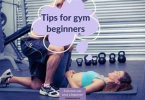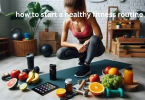Beginning a fitness journey is exciting—but it can also feel confusing when you’re not sure what to do or where to start. If you’ve ever asked yourself, “How do I start working out every day without overwhelming myself?”, then this guide is for you. In this article, we’ll walk through daily fitness tips for beginners, break everything down into simple language, and talk honestly about the benefits and possible drawbacks so you know exactly what to expect.
Think of this as a conversation between us—no complicated jargon, no pressure. Just straightforward, encouraging advice.
Why Daily Fitness Matters for Beginners

Before diving into the tips, let’s quickly talk about why daily movement is powerful, especially when you’re just starting.
- Daily activity builds healthy habits faster.
- It improves your energy levels and mood.
- It helps you learn discipline and consistency.
- It allows your body to adapt gradually without pushing too hard on any single day.
Now let’s go through the detailed tips.
1. Start Small and Build Slowly
One of the most important daily fitness tips for beginners is not to rush. Many people start too aggressively and then quit because it feels too hard.
How to Start Small
- Begin with 10–20 minutes of activity per day.
- Choose simple movements like walking, basic stretching, or light home workouts.
- Increase your workout duration by 5 minutes per week.
This allows your muscles, heart, and joints to adjust safely.
Why This Helps
Small daily wins create long-term consistency.
2. Always Warm Up Before Exercising
Never skip your warmup—this is your body’s way of preparing itself for movement.
Beginner-Friendly Warmup
- 1 minute of marching in place
- 20–30 arm circles
- 10–15 squats or knee bends
- Gentle stretching of your arms and legs
Benefits
- Reduces injury risk
- Increases mobility
- Makes your workout feel easier
- Helps your heart rate rise gradually
3. Learn Proper Form First
Good form is more important than how fast or how heavy you can go.
What Good Form Means
- Controlled movements
- Neutral posture
- Engaging the right muscles
- Avoiding jerky or rushed motions
Beginner Tip:
Watch tutorials, take your time, and focus on technique.
Benefits
- Prevents strains and injuries
- Improves muscle activation
- Helps you get visible results sooner
4. Include Variety in Your Routine
Doing the same thing every day gets boring—and your body stops progressing.
Mix These Types of Exercises
Cardio: walking, jogging, dance, cycling
Strength: bodyweight exercises, light weights
Flexibility: stretching, yoga, mobility work
Balance: simple balance drills or slow controlled movements
Benefits
- Keeps motivation high
- Works different muscle groups
- Prevents plateaus
5. Set Realistic and Achievable Goals
Goal setting is extremely important for beginners.
Examples of Realistic Beginner Goals
- “I will walk 15 minutes every day.”
- “I will drink 6–8 glasses of water daily.”
- “I will do three strength workouts this week.”
These small goals give you momentum.
Benefits
- Builds confidence
- Makes progress measurable
- Helps avoid frustration
6. Stay Hydrated Throughout the Day
Water helps your muscles and organs function effectively, especially when you’re active.
Beginner Hydration Tips
- Drink water consistently, not all at once.
- If you sweat a lot, increase intake slightly.
- Keep a water bottle visible—it encourages drinking.
Benefits
- Boosts energy levels
- Helps muscle recovery
- Prevents dehydration during workouts
7. Listen to Your Body’s Signals
There’s a difference between soreness and actual pain.
When to Stop
- Sharp pain
- Dizziness
- Trouble breathing
- Joint pain
When to Keep Going
- Mild soreness
- Light fatigue
- Slow heart rate increase
Benefits
Learning your body’s limits helps you exercise safely and confidently.
8. Fuel Your Body With Balanced Meals
Food is the fuel that powers your workouts.
Beginner-Friendly Nutrition Tips
- Add more protein (eggs, beans, chicken).
- Include whole grains for steady energy.
- Eat colorful fruits and vegetables.
- Don’t skip meals—especially before workouts.
Benefits
- Reduces fatigue
- Helps build muscle
- Improves recovery
- Supports overall health
9. Celebrate Small Wins
This isn’t talked about enough, but celebrating your progress is crucial.
Celebrate Things Like:
- Walking longer without losing breath
- Doing more reps than last week
- Feeling more energetic
- Sleeping better
- Feeling happier and more confident
Those small wins keep you consistent.
You may also like to read these posts:
Healthy Food Nutrition Chart Explained: The Ultimate Guide for Smart Eating
Protein and Calorie Facts for Diet: The Ultimate Friendly Guide
Simple Nutrition Facts About Fruits: Your Ultimate Friendly Guide
Understanding Nutrition Labels Easily: Your Complete Guide
10. Choose Activities You Enjoy

You don’t have to force yourself to do exercises you hate.
Try These Fun Options
- Dance workouts
- Swimming
- Hiking
- Yoga
- Beginner workout challenges
- Sports like badminton or cycling
Benefits
When you enjoy the activity, you’ll stick with it effortlessly.
Benefits of Daily Fitness for Beginners
Here are the major advantages beginners experience when they start daily movement:
1. More Energy Throughout the Day
Exercise increases blood circulation and boosts your metabolism.
2. Better Mental Health
Daily movement releases endorphins that reduce stress and anxiety.
3. Improved Sleep Quality
Your body calms down easier at night when it’s been active during the day.
4. Weight Management
Regular exercise helps burn calories and build metabolism-friendly muscle.
5. Stronger Muscles and Bones
Strength training helps prevent future injuries and improves posture.
6. Better Discipline and Routine
Exercising daily builds self-control and consistency in your life.
Possible Drawbacks of Daily Fitness (and How to Avoid Them)
It’s important to talk about the not-so-perfect side too so you can avoid common mistakes.
1. Overtraining
Beginners sometimes push too hard.
Solution:
Take 1–2 active rest days per week. Choose light yoga or walking.
2. Muscle Soreness
This is normal but can feel uncomfortable.
Solution:
Warm up, stretch, and don’t jump into intense workouts too quickly.
3. Risk of Injury
Incorrect form or rushing movements can cause strains.
Solution:
Prioritize proper technique and controlled movements.
4. Burnout or Loss of Motivation
Doing the same routine daily leads to boredom.
Solution:
Mix workout types and try new activities weekly.
5. Poor Nutrition Habits
Some beginners exercise but forget to fuel their bodies.
Solution:
Eat balanced meals and hydrate properly.
Final Thoughts
Starting a fitness journey doesn’t have to be complicated. These daily fitness tips for beginners are designed to help you take small, steady steps toward a healthier lifestyle. Remember, progress doesn’t happen overnight—but it does happen when you stay consistent, listen to your body, and enjoy the process.
You don’t need fancy equipment. You don’t need a gym membership.
You just need a little motivation and a lot of consistency.
FAQs
1. How often should a beginner exercise?
As a beginner, start with 10–20 minutes a day of light activity. Consistency is more important than intensity. Gradually increase your workout duration or intensity over time.
2. Is it okay to exercise every day as a beginner?
Yes, but listen to your body. Light daily activity like walking, stretching, or yoga is fine. Include 1–2 rest or active recovery days to prevent overtraining or injury.
3. What’s the best time of day to exercise?
The best time is whenever you can consistently fit it in. Some people feel more energetic in the morning, while others perform better in the evening. Choose a time that works for you.
4. Do I need special equipment to start exercising?
No! Beginners can start with bodyweight exercises, walking, or household items as resistance. As you progress, optional equipment like dumbbells, resistance bands, or a yoga mat can help.
5. How long before I see results?
Everyone is different, but beginners often notice:
Increased energy and better mood within 1–2 weeks
Improved endurance and strength in 4–6 weeks





